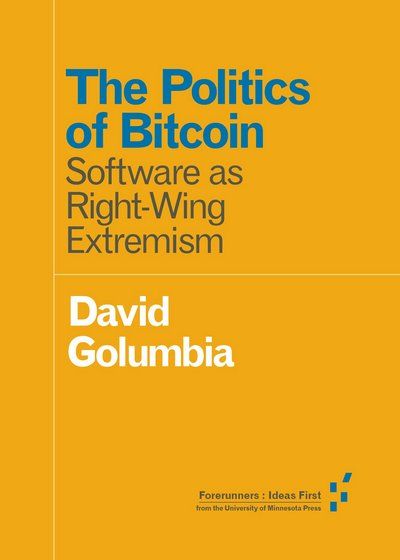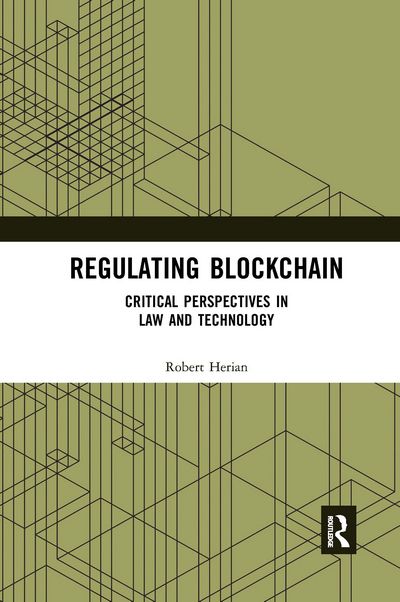[Do check out our extensive bibliographies for more readings.]
Yes, we have heard much about Bitcoin being a right-wing plot - David Golumbia's work remains highly influential; see also Jon Baldwin's paper on "decentralized network fetishism" - and there's much to that storyline. But we don't think it exhausts all the things about the politics of many crypto communities - they vary quite a bit - and also about the impact that these communities and their projects are having on national and global politics. These dynamics are anything but straightforward.

If we look at the broader ideological landscape, there's some interesting work [pdf] linking Bitcoin to neoliberailsm (via Maurizio Lazzarato's work) and our inability to think beyond global capitalism in general (see also this earlier, somewhat skeptical take of the inability of crypto to transcend existing power structures by the same author, JZ Garrod). A 2021 sociology dissertation on the political economy of cryptocurrencies does show that centralisation and consolidation tend to reassert themselves.
What are the socio-political imaginaries of crypto communities? Of course, they are too many and too diverse to generalise. Yet, some useful efforts have been made; see Moritz Becker's work. For the most optimistic take on crypto as a form of 'prefigurative politics,' see here. There's an intriguing argument that crypto has brought back enchantment and romanticism towards finance and technology. Inês Faria, who has made this point, has a lot of other interesting papers on various ideological and political consequences of crypto.
A similar point about the re-enchantment of the world by means of crypto is also made in this fascinating study of Bitcoin gamblers in South Korea: they don't see themselves as "calculative investors" but, rather, "enchanted gamblers who often rely upon magical formulas and rituals that express their hopes and despairs in the face of an uncertain future."
In line with Alain Supiot's and Katrin Becker's work on the dematerialisation of law (see also our interview with Becker), Alan Cunnigham penned an interesting 2016 article on the fear of the body that animates some of the crypto discourse. Robert Herian, also writing from a legal perspective, has also offered some interesting critical remarks about some of the ideological and political dimensions of crypto.

The question of trust – and its replacement and automation via technology - often resurfaces in blockchain-related sicussions. Johanna Rath offers a reasonable survey of the state of the debate. Matthew Zook and Joe Blankenship link some of these concerns about trust to the rhetorical power of algorithmic governance. Others looked at how the introduction of blockchain-based services mighte affect trust in the public sector itself. A recent study found that, in general, those in the blockchain community tend to be "less trusting of people and institutions, favors more private poverty, and is less pro-environmental than the general population."
Some of the most fertile areas of research looks at internal governance mechanisms of various blockchain-based communities and the political values and ideologies that they represent - and how those values, in turn, affect the design of technological infrastructures. There is more bureaucracy (or "blockocracy") in Bitcoin governance than meets the eye (not surprising to anyone who kept a close eye on, say, Wikipedia). A recent dissertation has also applied a Weberian lense to some of these governance mechanisms.
Jan Groos essay, looking at competing political visions present in the Ethereum protocol, is a must-read. Klara Jaya Brekke has done a lot of work - including an entire dissertation - on the internal politics of blockchain communities; she does point to a distinct "hacker-engineering" ethos that is present in some of them, which cannot be reduced to some libertarianism or neoliberalism. See, however, also this other dissertation on the constant evasion of the political - and its displacement onto the technological - by the Bitcoin community. Gil Vidan's work is equally indispensable.
There's an emerging debate about what it all means - beyond just questions related to economic sovereignty - for states and governments. Some argue that crypto presents a fundamental challenge to how we think about state sovereignty. Others take a more solutionist line and argue that it could help reinvent liberalism. There have been some early efforts to also read these changes through the theoretical lense of critical realism.
